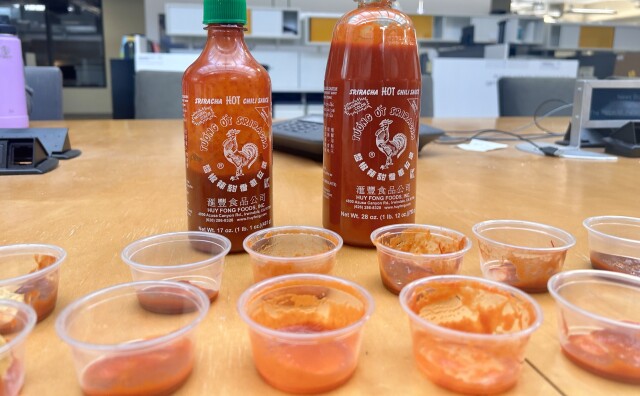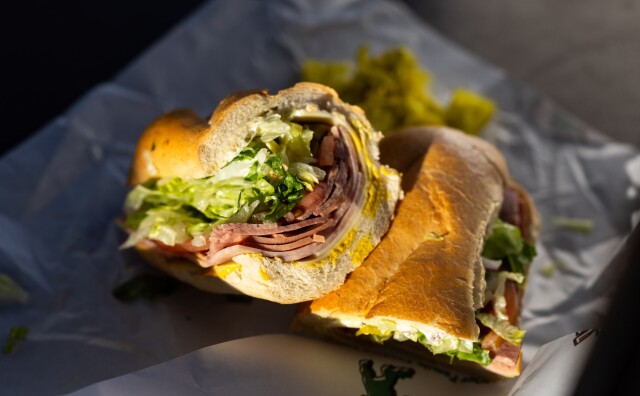For $6, This May Be The Best Smashburger In LA. We Had To Know More
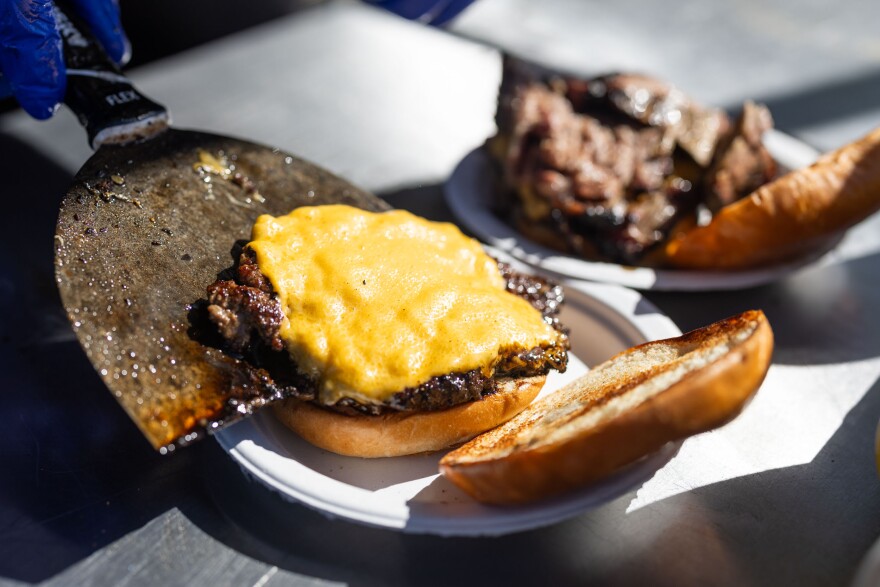
On a trip to his Costco in Hawthorne one day, Dustin Bartz had an epiphany. While perusing the meat aisle, he noticed American Wagyu ground beef selling for $5.99 a pound. That’s when the wheels inside Bartz's mind began turning.
Smash burgers, he thought.
Bartz’s business had been struggling at this point. His barbeque pop-up suffered a series of financial setbacks and wasn’t attracting enough customers.
This was back during the pandemic when certain foods became scarce, prices began to rise, and chef-driven pop-ups became popular due to so many chefs and cooks being out of work because of restaurant closures.
“I wrote a post on my Instagram after I was broke again and trying to make money,” Bartz said.
Bartz’s inspiration was brilliant in its simplicity: Use the pop-up model to address the food cost pinch we were all struggling with.
A restaurant, or a pop-up, didn’t need to charge much to be successful, he said.

And that’s how his $6 smash hit smash burger was born. It would become a crash course in restaurant economics for Bartz, as well as his followers on IG. Bartz even went as far as to post the actual prices he pays for goods and services and show how he passes on those savings to customers when he pops up weekly outside of the Alondra Park golf course in the city of Lawndale.
When I visited Bartz's pop-up, giant plumes of smoke from the burgers blew onto the sidewalk. That smoke came from the fat of the burgers and was so thick at the time that it left the lenses of my glasses grease-stricken and my clothes smelling of grilled beef.
$6 smash burger math
Here’s the breakdown of how Bartz makes money on a $6 burger: For each working day, Bartz buys 30 to 50 pounds of rich Wagyu beef at a time from Costco. Smashburgers being what they are — impossibly thin, crispy edges from the drippy, fatty beef — he produces four burgers per pound — adding cheese and occasionally adding some of his signature brisket or pulled pork with his signature sauce for a little bit of personal touch. (Bartz still sells his barbecue, primarily for preorder and based on availability.)
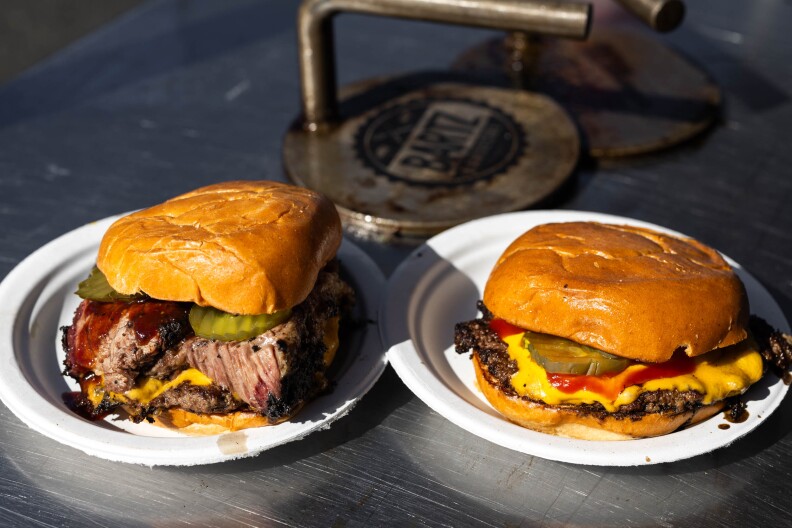
So, let’s do the math. It all means he can sell burgers for $6 — while other pop-ups charge $10 or more per burger — and still turn a profit.
Word soon got out after his Instagram post, followed by a brief mention by L.A. Taco, and people started to come in droves.
He was soon selling almost 1,000 patties each day throughout the weekend.
What is equally impressive is how Bartz keeps the line moving. He doesn’t want to be one of the pop-ups known for their hour-plus wait time.
So he keeps his menu tight (fewer offerings mean customers can quickly peruse it, which saves on food costs). That allows him to take 10-12 orders simultaneously, so each order only takes around five minutes.
$25 an hour for staff
Bartz is proud of his $6 burger price point. But what makes him prouder is that he pays all his employees a living wage of $25 an hour. (The downside of selling his burgers at lower prices is that customers aren’t always inclined to tip well, so he wanted to ensure the employees are adequately compensated.) He also adds a $1 tip for every sale for an added tip to his employees.
Bartz is staggeringly specific when breaking down the $6 smash burger cost across his social media accounts, which he does daily, like the self-promoting town cryer.

“The $6 burger is because that's the price it should be,” he said, as if everyone understands the economics of restaurants, one of the most notoriously tricky industries in America, evidenced by the fact that nearly 50% of all ventures go bankrupt.
Conventional wisdom, Bartz explained, can be broken down by a 30-30-30-10 rule of thumb: “You're supposed to have 30% max food cost, 30% labor cost, and 30% other costs, including your rent and whatever else.” Follow that method, and then the owners get to keep 10%, Bartz said.
But his economics are different: “I don't have the rent because we're just popping on the side of the road... So I keep 40%.”
Why the radical transparency?
Bartz seems hellbent on providing a certain level of radical transparency when it comes to helping his customer base understand the cost of his food. Why? Because it irritates his competitors, and he gets a kick out of it.
But it’s also great for business. Commenters on Instagram say things like, “Bro, it was the best burger I ever had,” and, “It's so so so rad to have watched your BBQ business just explode. So well deserved. Keep making the best food on the planet.” He’s also become a quasi-celebrity of sorts as a result. He’s recently become the de facto caterer of the legacy hip-hop group Cypress Hill and even became a regular on their podcast, Dr. Greenthumb Show.
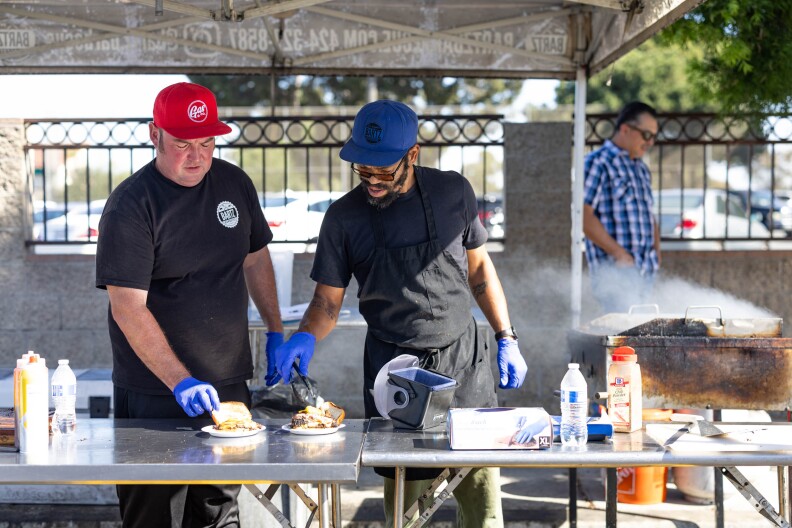
While selling his $6 burgers, he’s hoping to bring people's attention to other food vendors and what they're charging. He’s even gone as far as to recreate others' dishes on his Instagram stories to show precisely how much it cost (and how much he says customers are being overcharged).
Trolling aside, Bartz said he just committed to showcasing better business practices. Another example Bartz mentioned is paying his employees liveable wages.
“I figured if you offer 'em 25 bucks an hour, I can afford that. So then I get a better pool of people that wanna work for me,” Bartz said. And that “better pool” of employees makes him a better business.
Learning on the job
“I've never worked in a restaurant or a kitchen or anything until I started doing this thing,” he said. However, his employees have plenty of professional restaurant experience and help teach Bartz the ropes of running a successful operation. “I learned a whole lot,” Bartz added.
So, are the burgers good? Biting into one of his burgers does feel like a revelation, especially given the price. If you opt for the double, which comes out to $12, the two smashed patties that are hot off the flat top meld into each other due to the high-fat content, creating little pools of fat that spill out on the patty, creating perfectly craggy edges, topped with gooey slice of American cheese and pickles on a soft bun.
I would urge you to try one for yourself to judge.
Bartz’s smash burgers are a good reminder that quality doesn’t necessarily need a hefty price tag.
At the end of the day, Bartz said there’s no secret, which is why he’s so mystified that others continue to overcharge.
Pay people well, sell a quality product, and keep an eye on the bottom line.
That’s it, he said.
“I figured out a way to get my food cost down to two bucks on the burger,” he said. “And, I don't know if it's the best-smash burger, and I've never said anything like that, but I know that people like it and the price makes it so it's almost a no-brainer.”
-
After people began complaining online that Sriracha they'd bought recently didn't taste like the old stuff, we set out to find the answer. It didn't go well.
-
From tortas to tuna melts, all sandwiches tell a unique story as they celebrate Los Angeles' diverse tapestry of flavors with each bite.
-
The company behind Sriracha told us production has resumed.
-
Two amateur bakers take on a beloved, almost sacrosanct school treasure.
-
For Jeff Alulis, the Burger Quest became “something bigger” than him.
-
Ms. Donut is closing its door the last week of August.





